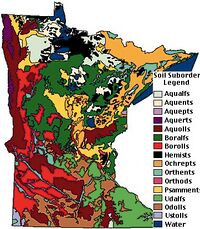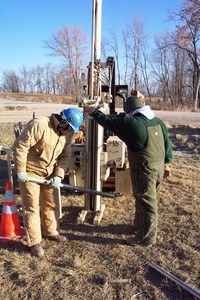
Difference between revisions of "Information on soil"
(Created page with "{{alert|We began building this page on March 17, 2020. It is therefore a work in progress and we anticipate gradually adding information on a wide range of soil-related topics...") |
m |
||
| (52 intermediate revisions by the same user not shown) | |||
| Line 1: | Line 1: | ||
| − | + | [[file:Check it out.png|200px|thumb|left|alt=check it out image|<font size=3>The [https://www.nrcs.usda.gov/wps/portal/nrcs/detail/soils/health/assessment/?cid=stelprdb1237387 USDA developed soil indicator fact sheets]. These two page fact sheets provide a nice overview for several important soil properties, such as infiltration, water storage, and bulk density.</font size>]] | |
| + | [[file:Check it out.png|200px|thumb|alt=check it out image|<font size=3>[https://soilhealth.cals.cornell.edu/training-manual/ Cornell University has developed a manual] for soil health and soil health assessment. The manual provides detailed discussion of several soil indicators, methods of analysis including sample collection, interpretation of results, and management strategies.</font size>]] | ||
| + | [[File:Direct push technology.jpg|200px|thumb|alt=soil probe image]] | ||
| + | [[File:MN soil suborders.jpg|200px|thumb|alt=image MN soil suborders|<font size=3>Minnesota soil suborders. Image [https://www.d.umn.edu/~pfarrell/mnsoil2.gif University of Minnesota.]</font size>]] | ||
| − | This page provides links to pages and external sources of information on soils. Links in red have not been developed yet. | + | {{alert|This page provides links to pages and external sources of information on soils. Links in red have not been developed yet.|alert-info}} |
| − | * | + | *General soil information |
| + | **[[Overview and role of soil in stormwater management]] | ||
**[[Soil classification]] | **[[Soil classification]] | ||
| − | **[[Soil | + | *Soil properties and processes |
| − | **[[Soil | + | **<Span title="This page provides basic information about soil erodibility, including information on types of erosion, calculations for soil erosion, and tools for assessing erosion."> '''[https://stormwater.pca.state.mn.us/index.php?title=Soil_erodibility Soil erodibility]'''</span> |
| − | **[[Soil | + | **<span title="This page provides information on soil structure, bulk density, texture, porosity, consistence, temperature, color, and soil physical processes"> '''[https://stormwater.pca.state.mn.us/index.php?title=Soil_physical_properties_and_processes Soil physical properties and processes]'''</span> |
| − | *Determining soil infiltration | + | **<span title="This page provides information on concentrations of specific chemicals (e.g. phosphorus, nitrogen, carbon, major cations (calcium, magnesium, sodium, potassium), sulfur, trace metals and elements), pH, cation exchange capacity, base saturation, salinity, sodium adsorption ratio, enzymes, and electrical conductivity."> '''[https://stormwater.pca.state.mn.us/index.php?title=Soil_chemical_properties_and_processes Soil chemical properties and processes]'''</span> |
| − | **[https://stormwater.pca.state.mn.us/index.php?title= | + | **<span title="soil biota, biologic cycling"> [https://stormwater.pca.state.mn.us/index.php?title=Soil_biologic_properties_and_processes '''Soil biologic properties and processes''']</span> |
| + | **<span title="This page provides information on infiltration and soil water"> [https://stormwater.pca.state.mn.us/index.php?title=Soil_hydrologic_properties_and_processes '''Soil hydrologic properties and processes''']</span> | ||
| + | *Managing soils | ||
| + | **<span title="This page addresses unintentional compaction issues at construction sites and presents methods for alleviating compaction."> [https://stormwater.pca.state.mn.us/index.php?title=Alleviating_compaction_from_construction_activities '''Alleviating compaction from construction activities''']</span> | ||
| + | **<span title="This page provides links to several pages in this manual that address erosion prevention at construction stormwater sites, including links to pages on specific erosion prevention practices."> [https://stormwater.pca.state.mn.us/index.php?title=Erosion_prevention_practices '''Erosion prevention practices''']</span> | ||
| + | **<span title="This page provides links to several pages in this manual that address sediment control at construction stormwater sites, including links to pages on specific erosion prevention practices."> [https://stormwater.pca.state.mn.us/index.php?title=Sediment_control_practices '''Sediment control practices''']</span> | ||
| + | **<span title="This page provides links to pages that address topics related to soil, engineered media, and soil/media amendments. It includes pages on amendments such as biochar, water treatment residuals, iron, and more, as well as engineered media specifications and properties.">[https://stormwater.pca.state.mn.us/index.php?title=Stormwater_and_soil,_engineered_(bioretention)_media,_and_media_amendments '''Stormwater and soil, engineered (bioretention) media, and media amendments''']</span> | ||
| + | **[[Guidance for amending soils with rapid or high infiltration rates]] | ||
| + | **[[Soil restoration]] - <span title="This page will provide an overview of types of soil restoration. It will include links to guidance for specific restoration activities, such as reducing compaction."> '''contents'''</span> | ||
| + | **[[Soil contamination]] - <span title="Assessment and risk analysis, management strategies"> '''contents'''</span> | ||
| + | *Soil measurements and methods | ||
| + | **<span title="This page provides a literature review, case studies, and recommendations for field measurement of soil infiltration."> [https://stormwater.pca.state.mn.us/index.php?title=Determining_soil_infiltration_rates '''Determining soil infiltration rates''']</span> | ||
| + | **<span title="This page presents a discussion of soil sampling, soil borings, and interpreting soil information."> [https://stormwater.pca.state.mn.us/index.php?title=Understanding_and_interpreting_soils_and_soil_boring_reports_for_infiltration_BMPs '''Understanding and interpreting soils and soil boring reports for infiltration BMPs''']</span> | ||
| + | **<span title="This page provides an overview of more common soil tests, links to information on sampling, and links to test methods."> [https://stormwater.pca.state.mn.us/index.php?title=Soil_sampling_and_tests '''Soil sampling and tests''']</span> | ||
| + | **[[Assessing soil suitability for stormwater applications]] - <span title="Will focus on factors to consider when evaluating soil for stormwater applications"> '''contents'''</span> | ||
| + | **<span title="Information on indicators used to assessing soil suitability for supporting hydrologic function, biologic function, chemical cycling, and erosion control. Includes assessment methods, management strategies, and links to additional information."> [https://stormwater.pca.state.mn.us/index.php?title=Assessing_soil_health_and_function '''Assessing soil health and function''']</span> | ||
| + | **[[Guidance for amending soils with rapid or high infiltration rates]] | ||
| + | *Tabled values | ||
| + | **<span title="Tabled values of porosity, field capacity, and wilting point for different soil textures"> [https://stormwater.pca.state.mn.us/index.php?title=Soil_water_storage_properties '''Soil water storage properties''']</span> | ||
| + | **[[Specific yields for geologic materials]] | ||
**[[Design infiltration rates]] | **[[Design infiltration rates]] | ||
| − | ** | + | *Soil resources and maps |
| − | *Soil | + | **<span title="Web Soil Survey (WSS) provides soil data and information produced by the National Cooperative Soil Survey. It is operated by the USDA Natural Resources Conservation Service (NRCS) and provides access to the largest natural resource information system in the world. NRCS has soil maps and data available online for more than 95 percent of the nation’s counties and anticipates having 100 percent in the near future. The site is updated and maintained online as the single authoritative source of soil survey information."> '''[https://websoilsurvey.sc.egov.usda.gov/App/HomePage.htm Web Soil Survey]'''</span> |
| − | **[ | + | **<span title="This site provides information about county-level and statewide digital data sets that describe the soils of Minnesota. Status information and links to detailed descriptions of the characteristics and limitations of the data sets are provided."> [https://www.mngeo.state.mn.us/chouse/soil.html '''Digital Soil Mapping in Minnesota''']</span> |
| − | **[ | + | **[https://www.nrcs.usda.gov/wps/portal/nrcs/surveylist/soils/survey/state/?stateId=MN Published soil surveys in Minnesota] |
| − | **[[ | + | **[https://extension.umn.edu/soil-management-and-health/soil-orders-and-suborders-minnesota Soil orders and suborders in Minnesota] |
| + | **[https://www.maswcd.org/SWCDs_On_The_Web/swcds_on_the_web.htm Minnesota SWCDs on the web] | ||
| + | |||
| + | [[Category:Level 2 - Technical and specific topic information/soils and media]] | ||
Latest revision as of 22:15, 8 February 2023

The USDA developed soil indicator fact sheets. These two page fact sheets provide a nice overview for several important soil properties, such as infiltration, water storage, and bulk density.

Cornell University has developed a manual for soil health and soil health assessment. The manual provides detailed discussion of several soil indicators, methods of analysis including sample collection, interpretation of results, and management strategies.

Minnesota soil suborders. Image University of Minnesota.
Information: This page provides links to pages and external sources of information on soils. Links in red have not been developed yet.
- General soil information
- Soil properties and processes
- Managing soils
- Alleviating compaction from construction activities
- Erosion prevention practices
- Sediment control practices
- Stormwater and soil, engineered (bioretention) media, and media amendments
- Guidance for amending soils with rapid or high infiltration rates
- Soil restoration - contents
- Soil contamination - contents
- Soil measurements and methods
- Determining soil infiltration rates
- Understanding and interpreting soils and soil boring reports for infiltration BMPs
- Soil sampling and tests
- Assessing soil suitability for stormwater applications - contents
- Assessing soil health and function
- Guidance for amending soils with rapid or high infiltration rates
- Tabled values
- Soil resources and maps
This page was last edited on 8 February 2023, at 22:15.
